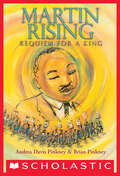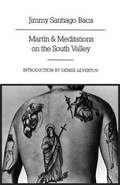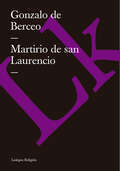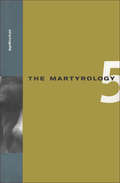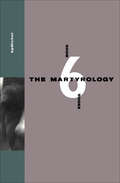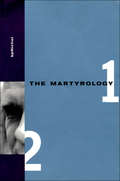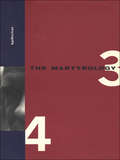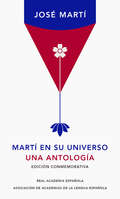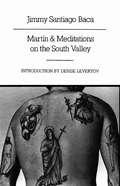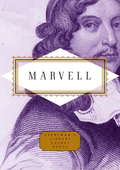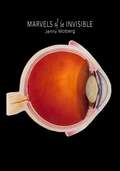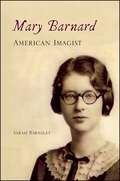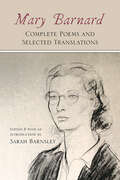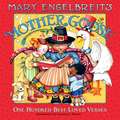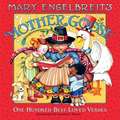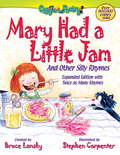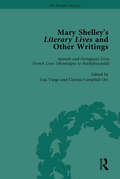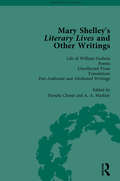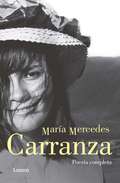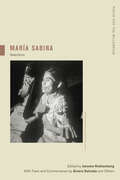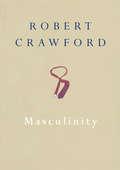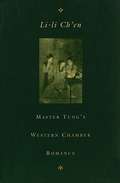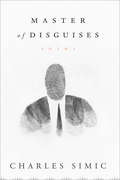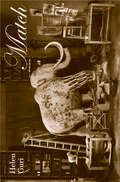- Table View
- List View
Martin Rising: Requiem for a King
by Andrea Davis Pinkney Brian Pinkney&“A powerful celebration of Martin Luther King Jr., set against the last few months of his life and written in verse&” (School Library Journal).Martin Rising is a stunning, poetic presentation of the final months of Martin Luther King, Jr.&’s life—told in a rich embroidery of visions, color, musical cadence, deep emotion, and multiple layers of meaning. Against a backdrop of the sanitation workers&’ strike in Memphis, Tennessee, the book builds to its rousing crescendo as King delivers his &“I&’ve Been to the Mountaintop&” speech—where his life&’s commitment to peaceful activism and his dream of equality ascend to their highest peak. The Pinkneys&’ powerful and spiritual look at King&’s legacy celebrates the courage and moral conviction of a man who changed the course of history forever. And even in the face of searing tragedy, he continues to inspire, transform, and elevate all of us who share his dream. Praise for Martin RisingA Washington Post Best Book of the YearA Kirkus Reviews Best Book of the YearA New York Public Library Best Book of the YearA School Library Journal Best Book of the Year&“Unique and remarkable.&” —Publishers Weekly, starred review&“Each poem trembles under the weight of the story it tells . . . Martin Rising packs an emotional wallop and, in perfect homage, soars when read aloud.&” —Booklist, starred review
Martin and Meditations on the South Valley
by Jimmy Santiago Baca Denise LevertovFiercely moving, the two long narrative poems of Martin & Meditations on the South Valley revolve around the semi-autobiographical figure of Martin, a mestizo or 'detribalized Apache.' Abandoned as a child and a long time on the hard path to building his own family, Martin at last finds his home in the stubborn and beautiful world of the barrio. Jimmy Santiago Baca 'writes with unconcealed passion, ' Denise Levertov states in her introduction, 'but he is far from being a naive realist; what makes his writing so exciting to me is the way in which it manifests both an intense lyricism and that transformative vision which perceives the mythic and archetypal significance of life-events.'
Martirio de san Laurencio
by Gonzalo De BerceoEl mártirio de San Laurencio has occupied an important place in literature since the late fourth century. Many versions exist as a dozen poems on St. Lawrence in Romance languages from the late twelfth century and early fourteenth have appeared, but the Berceo version is considered one of the best in its simplicity and straightforwardness.
Martyrology Book 5: The Martyrology
by Bp Nichol'All of Nichol's work is stamped by his desire to create texts that are engaging in themselves as well as in context, and to use indirect structural and textual devices to carry meaning. In The Martyrology different ways of speaking testify to a journey through different ways of being. Language is both the poet's instructor and, through its various permutations, the dominant "image" of the poem. The [nine] books of The Martyrology document a poet's quest for insight into himself and his writing through scrupulous attention to the messages hidden in the morphology of his own speech.' - Frank Davey
Martyrology Book 6
by Bp Nichol'All of Nichol's work is stamped by his desire to create texts that are engaging in themselves as well as in context, and to use indirect structural and textual devices to carry meaning. In The Martyrology different ways of speaking testify to a journey through different ways of being. Language is both the poet's instructor and, through its various permutations, the dominant "image" of the poem. The [nine] books of The Martyrology document a poet's quest for insight into himself and his writing through scrupulous attention to the messages hidden in the morphology of his own speech.' - Frank Davey
Martyrology Books 1 & 2: The Martyrology
by Bp Nichol'All of Nichol's work is stamped by his desire to create texts that are engaging in themselves as well as in context, and to use indirect structural and textual devices to carry meaning. In The Martyrology different ways of speaking testify to a journey through different ways of being. Language is both the poet's instructor and, through its various permutations, the dominant "image" of the poem. The [nine] books of The Martyrology document a poet's quest for insight into himself and his writing through scrupulous attention to the messages hidden in the morphology of his own speech.' - Frank Davey
Martyrology Books 3 & 4: The Martyrology
by Bp Nichol'All of Nichol's work is stamped by his desire to create texts that are engaging in themselves as well as in context, and to use indirect structural and textual devices to carry meaning. In The Martyrology different ways of speaking testify to a journey through different ways of being. Language is both the poet's instructor and, through its various permutations, the dominant "image" of the poem. The [nine] books of The Martyrology document a poet's quest for insight into himself and his writing through scrupulous attention to the messages hidden in the morphology of his own speech.' - Frank Davey
Martí en su universo: Una antología
by José MartíEl escritor que revolucionó la literatura en español. Nueva edición conmemorativa de la Real Academia Española y la Asociación de Academias de la Lengua Española. Poeta, ensayista, diplomático y político, el cubano José Martí es uno de los escritores latinoamericanos más importantes en la literatura del siglo XX en español. Precursor del modernismo que saltaría el océano Atlántico para instalarse también en España, inspirador de los movimientos revolucionarios que desembocaron en la independencia de Hispanoamérica, su poesía fue reconocida por autores de la talla de Juan Ramón Jiménez, Gabriela Mistral o María Zambrano. Como poeta, Martí influyó más allá del modernismo, ya que su compromiso político con la libertad hizo que en décadas mucho más recientes algunos de sus poemas fueran adaptados como canciones por figuras como Pablo Milanés o Silvio Rodríguez. Esta antología, preparada porla Real Academia Española y las Academias miembros de la ASALE, incluye toda la poesía de Martí, además de textos en prosa (artículos, ensayos, discursos) que dan cuenta de la dimensión total del autor. La edición se completa con estudios sobre el autor y su obra que dan cuenta de la dimensión de Martí como escritor, además de con un glosario y un índice onomástico. La crítica ha dicho:«Mi impresión es, dejada aparte la prosa, la de que los Versos sencillos son la isla genuina de la originalidad poética de Martí, que son la médula martiana, adonde no pudo colarse el enemigo. Esta isla me es, por eso, particularmente querida. Tengo en ella mis mayores gozos con el Maestro; tengo allí con él mi coloquio más logrado; desde este pedazo de su obra cae sobre mí el rayo martiano más vertical.»Gabriela Mistral «Martí no podía dejar de ser universal, de sentir universalmente el trozo de historia que le tocó vivir.»María Zambrano «Su ternura se alimentaba de un encantado manto freático, en territorios ubicados al sur y al norte. Al viajar, alternando miradas de águila y de paloma, le crecieron nuevas ramas y raíces, como al ser destinado por los aleros para meditar en las más agudas y suaves aristas materiales. Era un coloso colosal.»José Lezama Lima «Sería difícil citar otro caso de identificación de un país con un hombre, que alcance la magnitud de la encarnación de Cuba en la persona y la obra de José Martí.»Cintio Vitier
Martín and Meditations on the South Valley: Poems
by Jimmy Santiago BacaFiercely moving, the two long narrative poems of Martín & Meditations on the South Valley revolve around the semi-autobiographical figure of Martin, a mestizo or "detribalized Apache." Fiercely moving, the two long narrative poems of Martín & Meditations on the South Valley revolve around the semi-autobiographical figure of Martin, a mestizo or "detribalized Apache." Fiercely moving, the two long narrative poems of Martín & Meditations on the South Valley revolve around the semi-autobiographical figure of Martin, a mestizo or "detribalized Apache." Abandoned as a child and a long time on the hard path to building his own family, Martin at last finds his home in the stubborn and beautiful world of the barrio. Jimmy Santiago Baca "writes with unconcealed passion," Denise Levertov states in her introduction, "but he is far from being a naive realist; what makes his writing so exciting to me is the way in which it manifests both an intense lyricism and that transformative vision which perceives the mythic and archetypal significance of life-events."
Marvell: Poems
by Andrew MarvellThe great seventeenth-century metaphysical poet Andrew Marvell was one of the chief wits and satirists of his time as well as a passionate defender of individual liberty. Today, however, he is known chiefly for his brilliant lyric poems, including "The Garden," "The Definition of Love," "Bermudas," "To His Coy Mistress," and the "Horatian Ode" to Cromwell. Marvell's work is marked by extraordinary variety, ranging from incomparable lyric explorations of the inner life to satiric poems on the famous men and important issues of his time-one of the most politically volatile epochs in England's history. From the lover's famous admonition, "Had we but World enough, and Time, / This coyness, Lady, were no crime," to the image of the solitary poet "Annihilating all that's made / To a green Thought in a green Shade," Marvell's poetry has earned a permanent place in the canon and in the hearts of poetry lovers.
Marvels of the Invisible: Poems
by Jenny MolbergWinner of the Berkshire Prize, Tupelo Press's First/Second Book Award, selected by Jeffrey Harrison. In this award-winning debut collection, the smallest things of the world bear enormous emotive weight. For Jenny Molberg, the invisible and barely visible are forms of memory, articulations of our place in the cosmos. Parsing the intersections between science and personal history, and contemplating archival letters from 17th- and 18th-century scientists along with new studies in biological phenomena, Molberg's poems examine complexities of relationships with parents and the faultiness of certainty about earthly permanence. In the title poem, a child begins by looking at an ant through a microscope, and later, as a husband and father, with the same discerning eye he recognizes the cancer in his wife's breast. Marvels of the Invisible sounds the depths of both grief and amazement, two kinds of awareness inseparably entwined.
Mary Barnard, American Imagist
by Sarah BarnsleyPerhaps best known for her outstanding translation of Sappho, poet Mary Barnard (1909–2001) has until recently received little attention for her own work. In this book, Sarah Barnsley examines Barnard's poetry and poetics in the light of her plentiful correspondence with Ezra Pound, William Carlos Williams, and others. Presenting Barnard as a "late Imagist," Barnsley links Barnard's search for a poetry grounded in native speech to efforts within American modernism for new forms in the American grain. Barnsley finds that where Pound and Williams began the campaign for a modern poetry liberated from the "heave" of the iambic pentameter, Barnard completed it through a "spare but musical" aesthetic derived from her studies of Greek metric and American speech rhythms, channeled through materials drawn direct from the American local. The first book on Barnard, and the first to draw on the Barnard archives at Yale's Beinecke Library, Mary Barnard, American Imagist unearths a fascinating and previously untold chapter of twentieth-century American poetry.
Mary Barnard: Complete Poems and Selected Translations
by Mary BarnardThe most comprehensive collection of writing by award-winning US poet, renowned translator of Sappho, and trailblazing archivist Mary Barnard.Born in the Pacific Northwest, Mary Barnard (1909–2001) struck up correspondence with Ezra Pound in 1933, won Poetry magazine's prestigious Levinson Award in 1935, and moved to New York City the following year. There she met Marianne Moore and William Carlos Williams, who proclaimed her writing emblematic of "what we have been about all these years." This fully annotated volume makes available Barnard's complete poems for the first time, along with a robust selection of her translations and prose. Most well-known for her bestselling Sappho and her influential role as the inaugural poetry curator at the University at Buffalo, Barnard was a "second-wave" modernist and "late" Imagist whose regionally grounded writing also anticipated later eco-poetry. The volume's editor, Barnard scholar and biographer Sarah Barnsley, situates Barnard's work within these broader literary and cultural currents. Previously unpublished poems appear alongside Barnard's essays on her creative practice and friendships, illuminating the career, oeuvre, and ethos of this pivotal yet still underappreciated twentieth-century figure. With a foreword by Mary de Rachewiltz (author of Ezra Pound, Father and Teacher) and afterword by Barnard's literary executor Elizabeth J. Bell, Mary Barnard is essential reading for poets, scholars, and translators.
Mary Engelbreit's Mother Goose: One Hundred Best-Loved Verses
by Mary EngelbreitNew York Times bestseller! From the warm and colorful imagination of Mary Engelbreit comes a Mother Goose book bursting with warmth and humor.This highly illustrated treasury includes everyone’s favorite time-honored characters—Little Bo-Peep, Humpty Dumpty, Old King Cole, Jack and Jill, and many, many more. Readers will enjoy Mary Engelbreit’s interpretations of the mouse running up the clock, piggies going to market, and children dancing 'round the mulberry bush.With one hundred rhymes in all, all lavishly illustrated in Mary Engelbreit's signature style, this collection of time-honored verses is truly a book to behold. Makes an excellent gift for baby showers, new parents, and other special occasions!Special features include:• An introduction from children’s book historian Leonard S. Marcus• A note from Mary Engelbreit about the process of creating the book• An index of first lines—easy to track down your favorite rhyme!
Mary Engelbreit's Mother Goose: One Hundred Best-loved Verses
by Mary EngelbreitReaders will enjoy Mary Engelbreit’s interpretations of the mouse running up the clock, piggies going to market, and children dancing round the mulberry bush. With one hundred rhymes in all, this collection of time-honored verses is a book to behold. Makes an excellent gift for baby showers, new parents, and other special occasions.
Mary Had a Little Jam: And Other Silly Rhymes (Giggle Poetry)
by Bruce Lansky Stephen CarpenterThese all-new, delightfully silly nursey rhymes recount the latest adventures of Jack and Jill, Humpty Dumpty, Old King Cole, Old Mother Hubbard, Little Boy Blue, Little Bo-Beep, and other best-loved Mother Goose characters. Children have been waiting for this sequel for over 200 years. Sample verse: "Mary had a little jam; she spread it on a waffle. And if she hadn't eaten ten, she wouldn't feel so awful."This book is an iParenting Media Awards Back to School 2004 Winner: Poetry.
Mary Shelley's Literary Lives and Other Writings, Volume 2: Spanish And Portuguese Lives
by Lisa VargoThis collection covers the lyrical poetry of Mary Shelley, as well as her writings for Lardner's "Cabinet Cyclopaedia of Biography" and some other materials only recently attributed to her.
Mary Shelley's Literary Lives and Other Writings, Volume 4
by Nora CrookThis collection covers the lyrical poetry of Mary Shelley, as well as her writings for Lardner's "Cabinet Cyclopaedia of Biography" and some other materials only recently attributed to her.
María Mercedes Carranza. Poesía completa: María Mercedes Carranza. Poesía completa
by María Mercedes CarranzaLumen publica la obra completa de María Mercedes Carranza, una de las poetas más importantes del siglo XX en Colombia. En este libro el lector encontrará toda la obra de María Mercedes Carranza, desde su primer poemario Vainas y otros poemas (1973), hasta cinco poemas inéditos del que hubiera sido su último libro, Los placeres verdaderos. Su obra poética nos sorprende porque consigue hablar con las palabras precisas de la vida cotidiana, del amor y el desamor, de la soledad y de la muerte, pero sobre todo por la voz rebelde y a la vez profundamente humana con la que escribió sobre la guerra en Colombia. En sus propias palabras: "en estos momentos en los que el país se desangra (...), la poesía es más necesaria que nunca, porque cuando se interrumpen el diálogo y la comunicación, se remplazan las palabras por las balas y ocurre la violencia. Y la poesía es esencialmente, y nada más, comunicación. El país hoy necesita del diálogo, es decir necesita de la poesía". La crítica ha dicho: "María Mercedes ha buscado con ardor su propio lenguaje y ha combatido con dureza para llegar a ser una con él (...) Todas las palabras que están a su alcance pugnarán por salir a la luz: llegan a lograrlo sólo (...) las que se confunden con la intimidad del ser". Fernando Charry Lara "... belicosa es María Mercedes Carranza, pero de una belicosidad en la que pudorosamente se arropa el alma vulnerable y sensitiva de los poetas desterrados". Ernesto Volkening "...su principalísima preocupación es hallar las palabras para volver poesía su situación particular y concreta, (...) para poder escribir (...) sobre hechos que antes eran pura prosa de la vida cotidiana y que han hallado aquí la justa palabra que los nombra". Darío Jaramillo Agudelo "Como poeta radicalmente libertaria, en comunión no intuida, sino vivida, desde el alma propia y desde su propia y visceral experiencia, escribió contra la guerra y el escándalo moral que significa la indiferencia ante ella". Mario Rivero
María Sabina: Selections (Poets for the Millennium #2)
by Maria SabinaA shaman and visionary—not a poet in any ordinary sense—María Sabina lived out her life in the Oaxacan mountain village of Huautla de Jiménez, and yet her words, always sung or spoken, have carried far and wide, a principal instance and a powerful reminder of how poetry can arise in a context far removed from literature as such. Seeking cures through language—with the help of Psilocybe mushrooms, said to be the source of language itself—she was, as Henry Munn describes her, "a genius [who] emerges from the soil of the communal, religious-therapeutic folk poetry of a native Mexican campesino people." She may also have been, in the words of the Mexican poet Homero Aridjis, "the greatest visionary poet in twentieth-century Latin America." These selections include a generous presentation from Sabina's recorded chants and a complete English translation of her oral autobiography, her vida, as written and arranged in her native language by her fellow Mazatec Alvaro Estrada. Accompanying essays and poems include an introduction to "The Life of María Sabina" by Estrada, an early description of a nighttime "mushroom velada" by the ethnomycologist R. Gordon Wasson, an essay by Henry Munn relating the language of Sabina's chants to those of other Mazatec shamans, and more.
Masculinity
by Robert CrawfordIn MASCULINITY, Robert Crawford elegantly explores many aspects of that troubling concept, from imperial militarism to his own experiences as father, husband, and son. By turn affectionate and amusing, painful and self-excoriating, Crawford wryly examines, sometimes in intimate detail, what it is to be male - from awkward, unsporty and even more awkward adolescent, to husband, father of a child and, apparently, New Man. Clever, accessible, very funny and chillingly accurate, MASCULINITY is a sparklingly original collection. Star Trek Epigrams Mr Sulu, set the controls To Economy Wash. We're about to venture Where no man has gone before. Kirk to enterprise: 'I'm going back to my cabin With a box of Kleenex. I want to experience the lonliness of Command. '
Master Tung's Western Chamber Romance
by Tung Chieh-Yuan Li-Li Ch'EnComprising of 184 prose passages and 5,263 lines of verse to be narrated and sung by a performing singer-storyteller, it is an elaboration of the T'ang dynasty love story, The Story of Ying-ying, by Yuan Chen (779-831).
Master of Disguises: Poems
by Charles Simic&“This 20th collection from the former U.S. poet laureate departs only by degrees from his poems of earlier decades—but it could just be his best book.&” —Publishers Weekly (starred review) In his first volume of poetry since his tenure as poet laureate, Charles Simic shows he is at the height of his poetic powers. These new poems mine the rich strain of inscrutability in ordinary life, until it is hard to know what is innocent and what ominous. There is something about his work that continues to be crystal clear and yet deeply weighted with violence and mystery. Reading it is like going undercover. The face of a girl carrying a white dress from the cleaners with her eyes half-closed. The Adam & Evie Tanning Salon at night. A sparrow on crutches. A rubber duck in a shooting gallery on a Sunday morning. And someone in a tree swing, too old to be swinging and to be wearing no clothes at all, blowing a toy trumpet at the sky.&“Simic&’s compact poems carry concealed weapons amid unnerving juxtapositions . . . Simic&’s edgy, brooding poems are like saxophone solos played under a bridge in the deep, dark hours of the spinning world&’s bruising insomnia.&” —Booklist&“In retrospect, the man who&’s referred to himself as a &‘cheerful pessimist&’ succeeds again in demonstrating his ability to condense meaning without obscuring it, to empower his poems with paradox, and to mesh seamlessly the real and imagined. And though many of the poems in Master of Disguises continue a style trend, they are also verbal tightropes off which a reader rarely falls, tightropes that demand—and deserve—a reader&’s complete attention.&” —Rattle
Match
by Helen GuriRobert Brand has given up on real women. Relationships just haven't ever worked out well for him. He has, however, found a (somewhat problematic) solution, a new feminine ideal: the 110-pound sex doll he ordered over the internet. Showing an uncanny access to the voice of the rejected, unimpressive, emotionally challenged modern male, Helen Guri's debut collection explores Robert's transition from lost and lonely to loved, if only by the increasingly acrobatic voices in his mind. Match's touching, whip-smart poems chart the limits of the mind/body relationship in decidedly virtual times. Does our hero's lovesick, wry, self-searching and often self-annihilating gaze signal some catastrophic aversion to depth or a feverish (if unsettling) reassertion of the romantic impulse? Can anything good really happen when the object of one's affection is, literally, an object? And if she looks like a human being, can you ever know for sure she isn't one? Equal parts love story, social parody and radiant display of lyrical gymnastics, Match announces the arrival of a daring, forthright and stubbornly original new talent.
